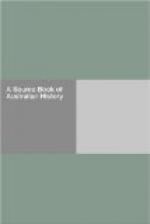If an unfortunate offender becomes as a penitent desirous of amending his life, and disposed to conform to the usages, and claims of honest society, he will find no man here spitefully to remind him of his former errors. But if he is brought wearing the badge of disgrace we will not have him. We will say to the British Government “Until you can with safety discharge him into your community, he shall not enter ours.” (Loud Cheers.) This is the righteous principle upon which we have taken our stand. Whilst we were disputing among ourselves who should bear the load, we were likely to be sacrificed by our ungenerous divisions. But we have now a new principle; and a principle is a wedge—if sufficient force is applied, every obstacle will be riven into shivers. We now say that no man should be an involuntary gaoler, much less shall the inhabitants of these colonies be the penal slaves and gaolers of the British Empire. (Cheers.) We assert that a community should deal with its own crime, at least so deal with it that in its disposal it shall not injure those who never offended—so at least that the honest and industrious labourer should not be brought into unfavourable comparison and competition with the hardened criminal, so that, at all events our sons shall not be driven from their homes to seek employment in distant lands—to meet there suspicion and contempt. These are the wrongs of which we complain—wrongs which could never have been perpetrated but in oblivion of that first great Law, alike the basis of private and public virtue: “do unto others as ye would that they should do unto you.” The Rev. gentleman resumed his seat amidst loud and prolonged cheering.
W.P. WESTON, ESQ.—It was with mingled feelings that he rose to address that meeting; but when he ascertained that Mr. West was to accompany him, he lost all fear, and at once accepted the invitation.
It had not been considered necessary to furnish them with written instructions how to act; it was left entirely to their own judgement; they had, as it were, a carte blanche; but he thought it advisable to mention one or two points towards which he and his colleague would direct public attention on the other side of the Straits. The first was, that transportation as hitherto conducted, was altogether and entirely rotten. He anticipated no very great difficulty in establishing that point. The next was, that no country had a right to force its crime upon a distant and unoffending one; it was a moral wrong. He was much struck at a remark which appeared in the Public journals in Melbourne. It seems to have been the custom of some persons to collect all the filth and rubbish from their persons and during the night to force it upon the premises of their neighbours. Now, these persons were designed miscreants, the paragraph commenced “the miscreants have been at work again.” But he considered that the Government who would force a mass of moral filth upon a small




